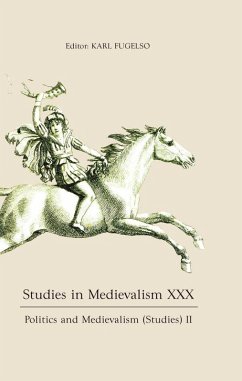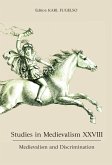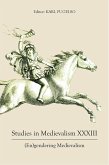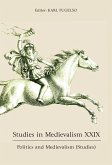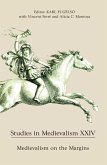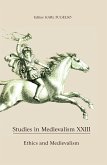Essays on the post-modern reception and interpretation of the Middle Ages,
This volume continues the theme of its predecessor, addressing how the Middle Ages have been invoked to score political points, particularly with reference to the rise of populism fueled by recent recessions and a pandemic. The nine essays in the first portion of the volume directly address political medievalism in Tariq Ali's 2005 novel on Mideast instability, A Sultan in Palermo; attempts by twentieth-century Czech politicians to anchor their causes in the fifteenth-century Czech hero Petr Chelcický; far-right deployment of Robin Hood memes to slander Hillary Rodham Clinton and Barack Obama; the ways Rory Mullarkey's 2017 play Saint George and the Dragon comments onEnglish national identity relative to Brexit; how national stereotypes have come into play amid cross-channel reporting on Brexit; nationalism in the medievalizing German monument to their fallen at the 1942 Battle of El Alamein;the English-speaking world's reception of Anthony Munday's 1589 book on conduct, Palmendos; nationalism in the self-characterization of two contemporary British Pagan movements; and how various communities in the television series Game of Thrones comment on medieval and/or contemporary nations. Nor are politics entirely absent from the final four articles in the volume, as they examine attempts to promote such particular agendas as toxic masculinity in Game of Thrones; misogyno-feminism there and in the George R.R. Martin book series on which the television program is based, A Song of Ice and Fire; the potential for audience self-realization amid the tension between the individual and the collective in The Mere Wife, Maria Dahvana Headley's 2018 adaptation of Beowulf; and ideal individual and collective behavior as modeled in the Ringling Brothers' 1912-13 spectacles about Joan of Arc.
Contributors: Leticia Alvarez-Recio, Susan Aronstein, Matthias D. Berger, Shiloh Carroll, Louise D'Arcens, Laurie Finke, John C. Ford, Alexander L, Kaufman, Stephen Lahey, Scott Manning, Galit Noga-Banai, S.C. Thomson, Ethan Doyle White, Karen A. Winstead,
This volume continues the theme of its predecessor, addressing how the Middle Ages have been invoked to score political points, particularly with reference to the rise of populism fueled by recent recessions and a pandemic. The nine essays in the first portion of the volume directly address political medievalism in Tariq Ali's 2005 novel on Mideast instability, A Sultan in Palermo; attempts by twentieth-century Czech politicians to anchor their causes in the fifteenth-century Czech hero Petr Chelcický; far-right deployment of Robin Hood memes to slander Hillary Rodham Clinton and Barack Obama; the ways Rory Mullarkey's 2017 play Saint George and the Dragon comments onEnglish national identity relative to Brexit; how national stereotypes have come into play amid cross-channel reporting on Brexit; nationalism in the medievalizing German monument to their fallen at the 1942 Battle of El Alamein;the English-speaking world's reception of Anthony Munday's 1589 book on conduct, Palmendos; nationalism in the self-characterization of two contemporary British Pagan movements; and how various communities in the television series Game of Thrones comment on medieval and/or contemporary nations. Nor are politics entirely absent from the final four articles in the volume, as they examine attempts to promote such particular agendas as toxic masculinity in Game of Thrones; misogyno-feminism there and in the George R.R. Martin book series on which the television program is based, A Song of Ice and Fire; the potential for audience self-realization amid the tension between the individual and the collective in The Mere Wife, Maria Dahvana Headley's 2018 adaptation of Beowulf; and ideal individual and collective behavior as modeled in the Ringling Brothers' 1912-13 spectacles about Joan of Arc.
Contributors: Leticia Alvarez-Recio, Susan Aronstein, Matthias D. Berger, Shiloh Carroll, Louise D'Arcens, Laurie Finke, John C. Ford, Alexander L, Kaufman, Stephen Lahey, Scott Manning, Galit Noga-Banai, S.C. Thomson, Ethan Doyle White, Karen A. Winstead,
Dieser Download kann aus rechtlichen Gründen nur mit Rechnungsadresse in A, D ausgeliefert werden.

